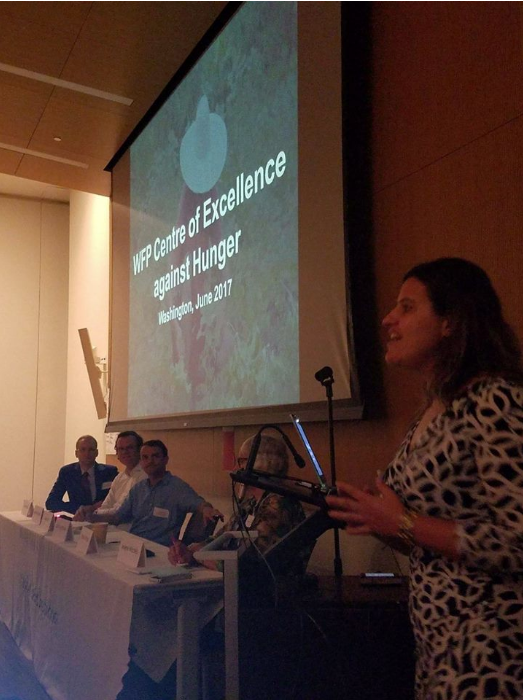On 15 June, the WFP Centre of Excellence against Hunger participated in the workshop “New Resources for International School Meals Programmes”, to discuss evidences on the impacts of school feeding programmes. The event took place in Washington D.C. and was organized by the Global Child Nutrition Foundation (GCNF) and the United States Department of Agriculture (USDA). It was an opportunity to discuss with decision-makers and influencers strategies to combine efforts and strengthen initiatives to promote food and nutrition security in developing countries, with focus on school feeding.
During the event, the WFP Centre presented its work and the impacts it has on partner countries, as well as the results of the study on the status and benefits of school feeding in African countries conducted in partnership with the African Union. Christiani Buani, head of Programme, represented the Centre at the workshop, also attended by representatives of non-governmental organizations, businesses, universities and research centres, the United States Agency for International Development (USAID), and United Nations agencies, such as WFP and the World Bank.
The Centre’s presentation focused on the work developed in countries that benefit from the McGovern-Dole International Food for Education and Child Nutrition Program, which helps support education, child development, and food security in low-income countries. The McGovern-Dole programme is a USDA initiative that provides for the donation of U.S. agricultural commodities, as well as financial and technical assistance, to support school feeding and maternal and child nutrition projects. The key objective of the programme is to reduce hunger and improve literacy and primary education, especially for girls.
Participants were invited to reflect on what are the best sources of data and information regarding school feeding programmes currently available; what kind of data is still needed to address the impacts of school feeding investments; and what information do governments need to decide whether to invest in school feeding.
To inform the discussions, some concrete experiences and research results were presented. Besides the WFP Centre’s work and impacts, participants could learn about a study on home-grown school feeding in Ghana, the African Union/Centre of Excellence study on the status and impacts school feeding in African countries, and case studies on private sector engagement in school feeding initiatives compiled by the Global Child Nutrition Foundation.
Discussions
“The WFP Centre of Excellence’s advocacy efforts contributed to the recognition of school feeding as an effective solution for hunger”, said Christiani Buani. She explained how the Brazilian school feeding programme works, the impacts it has on health and education indicators, the benefits for smallholder farmers providing food for the programme, and the integration of school feeding with other social protection policies. The Brazilian experience gained the attention of other developing countries. “Countries come to Brazil to gain new ideas, strategies and motivation to improve school feeding at home”, explained Christiani.

Nard Huijbregts, Lead Social Policy Advisor of the Economic Policy Research Institute (EPRI), presented the results of the study about the status and impacts of school feeding in African countries. The African Union commissioned the study to the WFP Centre of Excellence, and EPRI was responsible for the research. The research process included interviews with governmental and non-governmental stakeholders, 13 missions to countries, a continental survey on school feeding, and the preparation of 20 in-depth case studies.
According to the study, school feeding is a public super-good, or a combination of public goods that work together to achieve exceptional impacts that would not be possible without an integrated response. School feeding combines interventions in education, agriculture, health, gender, social protection, and nutrition. These impacts can only be achieved when programmes are implemented in a systems perspective, with integration among different sectors.
The study found that, in African countries, the impacts include improvements in education and learning, health and nutrition, increase of agricultural production, poverty alleviation, local economic development, community empowerment, and others. The research also points out a set of recommendations for African policy-makers and governments to improve school feeding programmes throughout the continent. The results will be presented to the African Union heads of state in July.
Gene White Award
Also in Washington D.C. took place the Gene White Lifetime Achievement Award, held by the Global Child Nutrition Foundation. Every year, the award recognizes people who made a significant contribution to child nutrition.

This year, the award honored Dr. Akin Adesina, President of the African Development Bank Group, for his extraordinary contributions in advancing agricultural development to provide a sustainable source of nutritious foods for school nutrition programmes.
Top photo: WFP/Nyani Quarmyne




